Do you know what the thyroid does? ( if you hate reading just go to the Videos )
One of the most common questions I get is how do I know if this is my thyroid?
In this article, you will learn what the thyroid really is and how to determine if the problems you have are from the thyroid.
-
What the thyroid does
-
What are the symptoms of a poorly functioning thyroid( high and low)
-
What is needed for the thyroid to function properly

-
The thyroid is derived from the Greek word Thyreos which means shield and eidos which means form. It helps burn calories and keeps the metabolic machine working.

11157246 – burning oil lamp
The thyroid is an important endocrine gland that produces 2 hormones main hormones T3 ( triiodothyronine: 3 iodine molecules connected to the tyrosine) and T4 ( thyroxine or 4 iodine molecules connected to the hormone). The gland also has C cells that produce an important hormone that affects calcium metabolism the calcitonin.
The thyroid gland sits in the neck are just above the breastbone and below Adam’s apple.
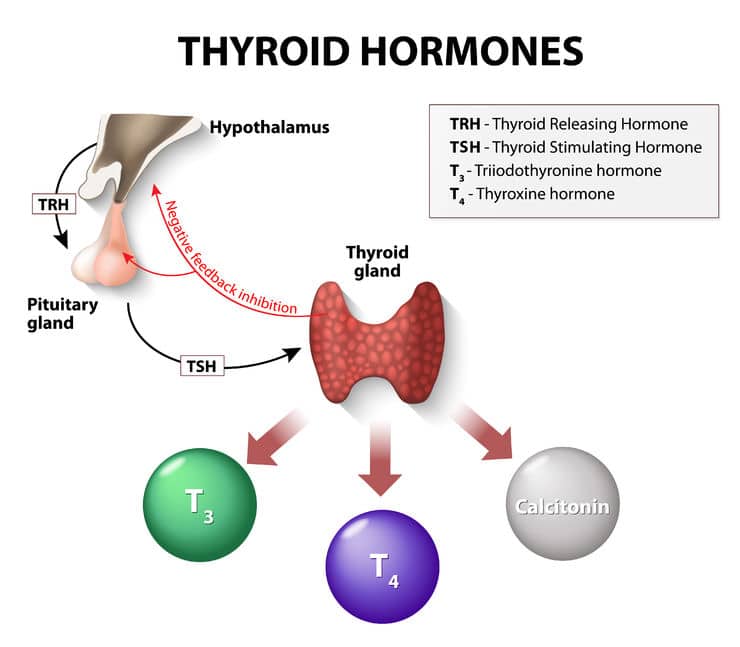
44721853 – thyroid hormones. human endocrine system.
Video 1
For proper functioning of the thyroid we need to have the following:
3 glands to work:
-
The Hypothalamus the main area of the brain that produces the TRH( thyrotropin-releasing hormone). This is done in response to low circulating thyroid hormones.
-
The Pituitary: TRH leads to the production of TSH or Thyroid stimulating hormone from the pituitary gland
-
The Thyroid: TSH, in turn, signals the thyroid to release it’s formed hormones T4 (thyroxine )and T3 ( triiodothyronine).
-

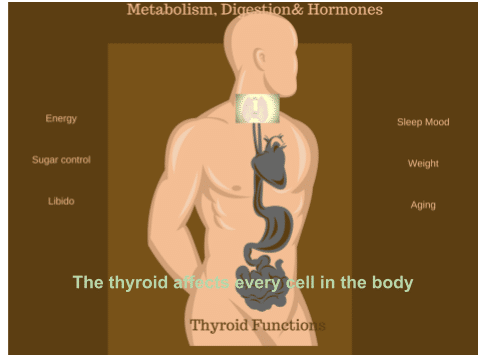
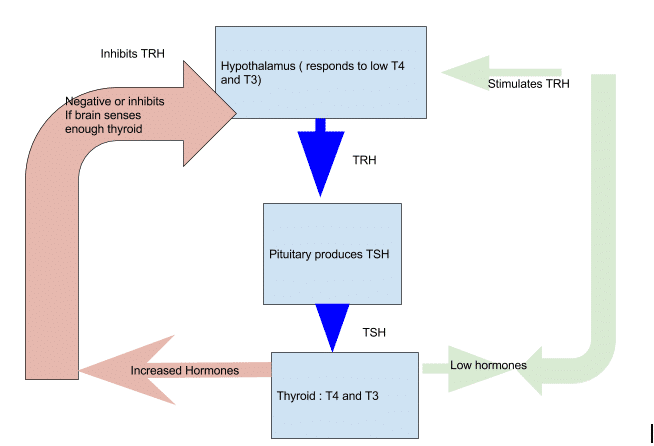
-
3 major steps that lead to thyroid hormone production.
1.The gland senses the levels of the thyroid stimulating hormone(TSH) in the blood vessels which is passing through the gland( needs proper functioning of the hypothalamus and pituitary).
2.Low levels in the blood of the thyroid hormones(T4 &T3) stimulates the production of TRH then TSH and this leads to the production of new thyroid hormones or the release of the thyroid hormones from the gland.
In the thyroid, it needs the rich protein thyroglobulin which has an amino acid called tyrosine this combines with iodine a very crucial step in the proper production of the thyroid hormones.
Once produced the thyroid is released mostly as the T4 or the inactive hormone and this is converted later to the active hormone or T3.
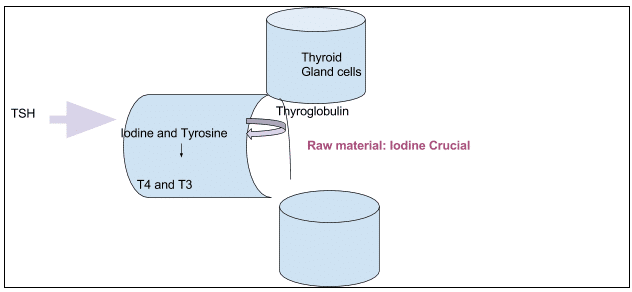
-
Above diagram is a look at the inside of the cells of the thyroid
3. The release of T4 and conversion of the T4 to T3 ( the active hormone) are the next crucial steps.

-
VIDEO 2
-
The numbers indicate the molecules of iodine attached to the hormone. Deiodinase is the enzyme that helps with the removal of the iodine to activate the thyroid. This enzyme is found in the liver, kidney and most cells.
Location and functions:
The thyroid gland is located in the neck in front of the trachea. It is the main metabolic hormone and also the hormone that to some degree determines your age and beauty.
The proper functioning of the glands is important and the complete absence of any one of these, if not noted, can become incompatible with life. The overactivity can also become incompatible with life if not noted early enough
Of the two hormones, the more active is T3. This is the most important metabolic hormone. When it is absent the metabolic rate goes down by 40% and when it is really high as in Hyperthyroidism, the metabolic rate increases by 60 to 100% more.
The thyroid hormone gets into every cell and triggers all of the cell processes and so it helps with the utilization of the carbohydrates, and fats and vitamins.
It’s effect on Metabolism and hormones:
-
Digestion is optimized.
-
Blood sugar control is good
-
Energy is optimal
-
Libido is normal.
-
Menstruation
Thyroid hormones help with the function of digestive enzymes and some of the hormones. So it keeps the metabolic rate optimal. Interestingly it also affects the action of other hormones( functions of the body) not just action of enzymes( processes of metabolism). It can improve the absorption of sugars and increase insulin to get sugar into the cells for energy production. The other hormones it affects are the sex hormones. This leads to menstrual abnormalities in women ( if there is an imbalance) and also decreases in libido in both men and women.
Digestive system:
Functions affected by the work of the thyroid
-
Bowel movements
-
Function of the gallbladder
-
Digestion
It helps with every system in the body including digestion by increasing the enzymes. It improves the movement of the bowels once again aiding in digestion and movements.
Brain functioning
-
Alertness
-
Sleep
-
Mood
With the brain, it does improve the functional process however it becomes more relevant if it is high when anxiety can be an issue. When it is low then it can lead to the constant feeling of sleepiness or longer sleeping hours and difficulty memorizing. Depression diagnosis can be associated with low thyroid functions. This has to be checked before someone is diagnosed with depression
Musculoskeletal Activity:
-
Build and strength of muscles
-
Bone density
In the musculoskeletal structure helps the muscles contract with greater vigor and if it is low then the muscles become flabby.
Vascular System:
-
Pumping of the heart
-
Blood pressure
-
Cholesterol
The heart also pumps increased volume of the blood per beat. Breathing improves as the metabolic rate improves.
Other important benefits for the blood flow and heart functions are that the thyroid reduces cholesterol by increasing its removal from the blood and its metabolism. It also allows the cholesterol to be excreted via the bile and get dumped out via stools.
Skin Changes:
-
Affects the oil production
-
Hair length thickness and quality
-
Nails quality
Overall it is the anti-aging and energy hormone as it helps the better absorption and utilization of the vitamins and nutrients and functioning of the glands of the body. Thus any abnormality of the gut and the basic functioning of the hormone can lead to decreased wellness and increased aging.
VIDEO 3
-
-
Symptoms of a low functioning thyroid therefore are:
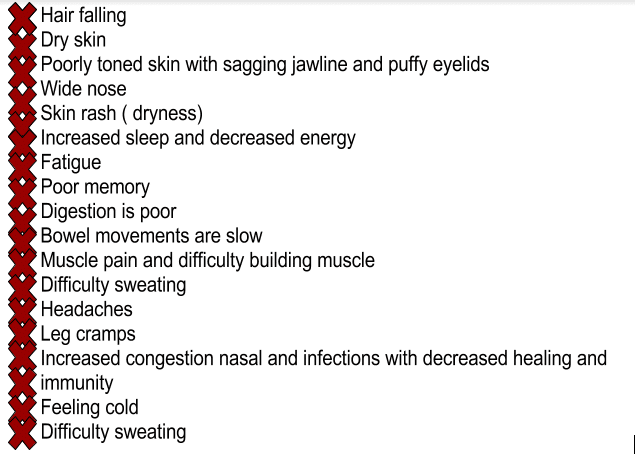
Symptoms of the abnormally high functioning thyroid:
![]()
It has to be remembered that the Thyroid is only one of the major endocrine glands and does not work on its own but in synchrony with the others.
VIDEO 4
The other endocrine glands affected by or affecting the function of the thyroid are:
-
Insulin-Like growth factor I ( increase can lead to goiter)
-
Cortisol ( leads to suppression of the thyroid)
-
Cytokines and interleukin- during inflammation or infections ( leads to destruction of the thyroid)
-
Sex hormones ( loss of libido/ menstrual abnormalities)
So the thyroid is essential to our normal functioning head to toe. Just as it protects us it is important for us to live our lives protecting it.
If the thyroid gland is normal the deficiencies of the following can cause the hormone to be formed poorly:
Iodine crucial for its formation. Deficiency can lead to goiter.
T4 needs to be converted to T3 by this enzyme called deiodinase present inthe tissues, liver and kidney and brain and this conversion needs:
-
Selenium
-
Zinc
-
Iron.
So women who have the heavy menstrual cycle due to increased estrogens and insulin tend to be anemic and will gain weight as the thyroid conversion cannot take place from the low iron, induced by heavy bleeding. People on frequent low-calorie diets are usually deficient in a lot of minerals.
Similarly, deficiency of the other minerals and Vitamin A, in particular, can lead to low thyroid functions, as the hormone will not be able to work without them as indicated below.
So simply replacing the thyroid with medications will not help
We have to
1.Identify any deficiencies or the minerals it needs for proper functioning. ( if they are deficient we need to know why and not simply replace it)
2.Identify if there is a problem with conversion as T4 can become T3( the most active hormone) or reverse T3 ( the bad twin of the active T3 an inactive form). The latter happens if the person has a lot of inflammation or is ill.
3.Identify where the problems are: Hypothalamus, Pituitary or Thyroid itself
VIDEO 5
-
If the thyroid hormones are normal it can effect its functions and therefore us in 2 different ways.
It mostly goes into the cells of the body to the brain of the cell called the nucleus and changes the genetic message so, for instance, it can increase the production of energy. This action requires cofactors and the lack of cofactors can make the thyroid function poorly.
It can also work outside the brain of the cell in the cytoplasm or the areas within a cell wall and cause some changes to the activity of the cell.
So for proper functioning, the following glands(steps) need to be working
Brain (hypothalamus: timely release of TRH)
Pituitary( timely release of TSH)
Thyroid( perfect orchestration of the formation fo the T4 and T3)
You need these raw materials
Iodine
Iron
Selenium
Zinc
Vitamin A
In the cells, the specific enzymes called deiodinase to convert the T4 to T3 all of the enzymes have to work. If the wrong deiodinase works then most of the T4 can get converted to the “bad twin” reverse T3 or rT3, which will lead to low thyroid functions as it is an inactive form. This is why rT3 is important as if this is high you have normal TSH and T4 but low functioning Thyroid.
Any imbalance causes symptoms and the cause of imbalance has to be sought in by taking the following steps:
Story ( history of injury stress infections etc.)- what triggers are there, this will require an accurate history.
Raw materials or minerals – what keeps it from making and working.
Proper functioning of the enzymes in the conversion of the T4 to T3- what is inhibiting the conversion of the hormone.
You can, therefore, see that the thyroid doesn’t work in isolation and the dysfunction can be due to various factors and it is not simply a matter of what type of a thyroid hormone you are taking.
If there are any questions and you need further information shoot it over so we can answer them.
VIDEO 6
- dR.Nisha Chellam
- Email at : Drchellam@holisticicon.com
Click Here to see: “5 Benefits to Turmeric, Ayurveda’s Golden Botancial”